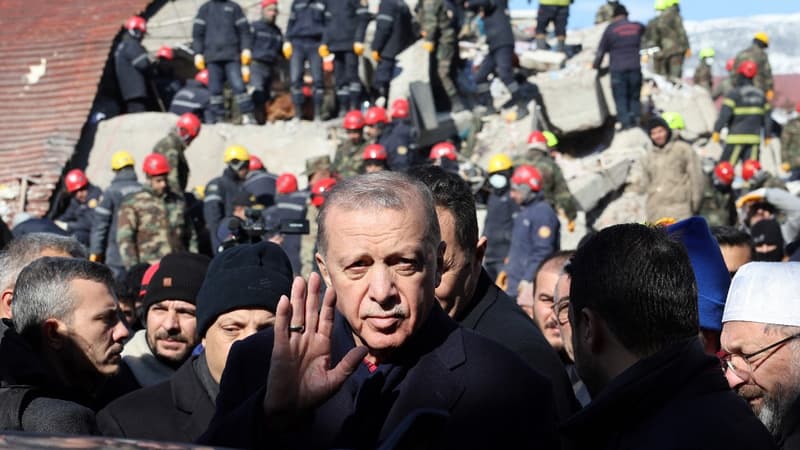The balance sheet continues to grow. While the WHO warned that 23 million people could be affected by the disaster, at least 17,500 people died in the quakes that mourned Anatolia, including 3,162 in Syria and 14,351 in Turkey.
Since Monday, the victims have continued to pour in and the Turkish authorities have been under fire from criticism. While many residents of the disaster areas deplore the slow arrival of aid and the insufficiency of emergency aid, Recep Tayyip Erdoğan acknowledged on Wednesday “gaps”.
“It is impossible to be prepared for such a disaster,” he pleaded during a trip to Hatay province, near the Syrian border.
upcoming elections
These earthquakes occur three months before the crucial presidential and legislative elections for the Turkish president. The latter was already in an awkward position before Monday, “balanced in the polls,” according to Dorothée Schmid, head of the Contemporary Turkey and Middle East program at IFRI.
In 1999, during the last major earthquake in Turkey that killed more than 17,000 people, it was partly criticism of the authorities that led Erdogan’s party, the AKP, to victory three years later. The then Prime Minister, Bulent Ecevit, had been the target of attacks for his relief efforts for the populations.
This time, the Head of State immediately declared a maximum level of emergency requesting international help and went to certain affected provinces.
“An effective emergency response could strengthen the head of state and his party by creating a sense of national solidarity under Erdogan’s leadership,” Wolfango Piccoli of political risk consultancy Teneo said in a note.
“If he loses the post-earthquake response, Erdogan could lose the May elections,” Emre Caliskan, a researcher at the Foreign Policy Center, qualifies on the other hand with AFP.
An authoritarian and centralized regime
“Erdogan was taken aback: it is an increasingly authoritarian and increasingly centralized regime, so in situations like that there is not a very good ability to react,” explains Dorothée Schmid on BFMTV.
“It’s the president who decides everything,” she says.
Furthermore, Recep Tayyip Erdogan is especially criticized for having sidelined the army. As soon as the earthquakes hit, the army did not act soon enough because the government canceled a protocol that allowed it to act without instructions.
“The army can no longer be on the front line because it is a potential competitor for Erdogan, while it is the most effective in emergency situations,” Dorothée Schmid details.
The opposition also criticizes Erdogan’s repression of civil society for several years, especially since the failed 2016 coup. The leader of the main opposition party, Kemal Kilicdaroglu, has accused the government of not cooperating with local authorities and weaken non-governmental organizations that could help.
Corruption in the construction sector
If earthquakes are impossible to predict and their intensity is surprising, the region is highly vulnerable to seismic risks. In recent images, we see thousands of buildings collapsing under the violence of the tremors. Consequently, the quality of the building is questioned.
Since the 1999 earthquake, buildings must comply with new anti-seismic standards. “We see buildings that are leaning only on the ground floor, that means it wasn’t built according to the law, it shouldn’t have fallen down,” Patrick Coulombel, founder of “Emergency Architect,” explains to BFMTV.
In fact, the opposition and some residents point to poorly regulated and poor quality construction. “There was a need to build quickly, in a very poor population. In the emergency there are illegal constructions that are later legalized with corruption, but it turns out that most of these cities are administered by the president’s party”, explains the researcher. Dorothée Schmid.
“The construction industry in Turkey is riddled with corruption: there are greedy builders but also authorities who don’t enforce the rules,” agrees Oya Özarslan, president of Transparency International Turkey.
In addition, Erdogan embodies for many Turks the construction fever that has gripped the country since he came to power in 1994, first as mayor of Istanbul, then since 2003 as head of Turkey.
Following the 1999 tragedy, the Turkish state introduced an “earthquake tax”. However, it is unclear how it is being spent and criticism is mounting from a public questioning how its money has been used.
The muzzled critics
If Erdogan expressed something my fault Confessing to “shortcomings”, he denounced “a few dishonest and dishonorable people who published false statements such as ‘we did not see soldiers or police'”.
“Our soldiers and our police are honorable people. We are not going to allow disreputable people to talk about them that way,” she warned.
Turkish police have arrested a dozen people since Monday’s earthquake over social media posts criticizing the government’s handling of the disaster.
In addition, Twitter has become inaccessible on Turkey’s main mobile phone providers, as social media has been flooded with messages from people complaining about the lack of help, especially in the Hatay region.
On twitter, opponent Kemal Kilicdaroglu punished this block. “This foolish government has blocked communications on social media. The result is a drop in calls for help. We know what they are trying to hide and we await their explanations, ”he accused.
If criticism is heard, Erdogan is protected by a press that is wholly owned by him. “Broadly supportive domestic media also means Erdogan will drive the official narrative and can take advantage of the situation,” Adeline Van Houtte, senior Europe consultant at The Economist Intelligence Unit, said in a note.
Source: BFM TV


